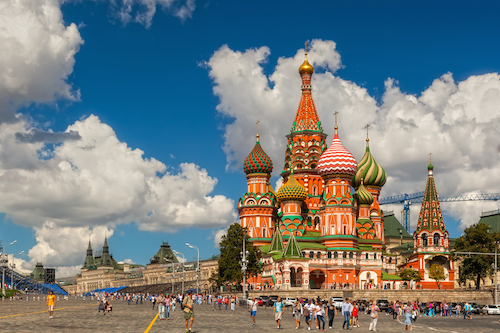9 Surprising Facts About the Russian Language
So you’ve learned about the rise and fall of the USSR, you’ve read Tolstoy’s War and Peace, and you’ve even listened to some operas by Tchaikovsky. But how much do you really know about the Russian language? Did you know that astronauts have to learn Russian before going into space? Or that Russian speakers are better at differentiating between shades of blue than English speakers? If you want to learn more fun and surprising facts about this richly fascinating language, read on.
Table of Contents
- 1. The verb “to be” only exists in the past and future tense.
- 2. All adjectives have multiple syllables – with one exception.
- 3. Russian is the most widespread language in Eurasia.
- 4. A word’s stress pattern can drastically alter its meaning.
- 5. If you want to be an astronaut, you have to learn Russian.
- 6. About 10% of Russian words bear resemblance to English ones.
- 7. There’s a rule against Russian words starting with the letter “A”.
- 8. Russian surnames vary by gender.
- 9. Russian speakers outperform English speakers at distinguishing shades of blue.
 Image via Anton Zelenov / Wikipedia
Image via Anton Zelenov / Wikipedia
1. The verb “to be” only exists in the past and future tense.
Some languages (e.g., Spanish) have multiple ways of saying the verb “to be”, whereas others (e.g., Arabic) lack the verb altogether. Russian, however, is unique in that “to be” (быть) exists, but it’s never used in the present tense. Rather, it’s only found in past- and future-tense constructions.
2. All adjectives have multiple syllables – with one exception.
Many Russian words consist of one syllable or even just one character. However, virtually all adjectives have two or more syllables. The only exception is злой, which means “angry”.
3. Russian is the most widespread language in Eurasia.
With over 170 million native speakers, Russian is the eighth most-spoken language in the world. However, due to Russia’s enormous size, native Russian speakers cover the greatest geographical reach out of all the languages in Eurasia. It even beats out China, which has over seven times as many speakers.
4. A word’s stress pattern can drastically alter its meaning.
In Russian, where the emphasis falls on the word is important. For example, я плачу – in which emphasis is on the second syllable – means “I’m paying”. However, я плáчу – in which the emphasis is on the first syllable – means “I'm crying”.
5. If you want to be an astronaut, you have to learn Russian.
Due to Russia’s presence in space technology, and especially in the International Space Station, it’s now a requirement for foreign astronauts to have a working knowledge of Russian. So, if you want to go to space, you better crack open your Russian dictionary in between studying for astrophysics exams, or you’ll have to stay down on earth!
How good is your Russian? Put your skills to the test with this free online level test and find out!
6. About 10% of Russian words bear resemblance to English ones.
Hopeful astronauts can breathe a sigh of relief: though the Russian language’s six cases can be a challenge to memorise, about one in ten Russian words is very close to a similar word in English. For example, проблема (pronounced “problema”) means “problem”, and кофе (pronounced “kofi”) is “coffee”.
 Image via Sansculotte / Wikipedia
Image via Sansculotte / Wikipedia
7. There’s a rule against Russian words starting with the letter “A”.
Since the earliest times, native Russian words almost never start with the letter “A”. Some notable exceptions include азбука (alphabet) and авось (perhaps), but these exceptions are far and few in between. If you see a Russian word that starts with “A”, there’s a good chance that it’s borrowed from another language.
8. Russian surnames vary by gender.
Russian names consist of a first name, a family name, and a patronymic name, which is the father’s name plus the ending -ovich for a son and -ovna for a daughter. So if a father named Ivan has a son and a daughter, his son’s patronymic name will be Ivanovich and his daughter’s will be Ivanovna.
9. Russian speakers outperform English speakers at distinguishing shades of blue.
Unlike English, in which the line between “light blue” and “dark blue” is fuzzy, the Russian language splits the colour blue into completely different words: синий for dark shades and голубой for lighter shades. As a result, it’s been found that Russian speakers can distinguish and categorize different shades of blue more accurately than English speakers.
Even if you’ve made it through the thousand-plus pages of Anna Karenina, we bet you didn’t know about the prohibition against words starting with “A”, or how to form boys’ and girls’ patronymic names!
Indeed, Russian is a beautiful language that is full of quirks and oddities. Want to learn more about Russian? Listen & Learn offers face-to-face and online Russian classes tailor-made to suit your level and needs. Check out our course and package options or send us a quick inquiry to find out more.


